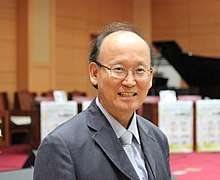Ky-Chun So
| Ky-Chun So Kwang Jang Chair Professor of the New Testament, Early Christianity, and the Nag Hammadi Library at Presbyterian University and Theological Seminary | |
|---|---|
 Professor Ky-Chun So(소기천 교수) | |
| Nationality | South Korea |
| Education | Th.B (1981), Th.M. (1982), M.Div (1984), Ph.D. (1998) |
| Alma mater | Claremont School of Theology, Claremont Graduate University |
| Occupation | Professor, Presbyterian University and Theological Seminary |
| Known for | Early Christianity, Historical Jesus, Oral gospel traditions, Q source |

Ky-Chun So(Hangul: 소기천; born 10 June 1958) is a South Korean theologian and is the Kwang Jang Chair Professor of the New Testament, Early Christianity, and the Nag Hammadi Library at Presbyterian University and Theological Seminary in Seoul.[1][2][3] At Claremont School of Theology and the Claremont Graduate University, California, USA, he studied New Testament theology, Nag Hammadi texts and Gospels from James M. Robinson, a disciple of Rudolf Bultmann. Since 1989, he has been involved in researching the restoration of the historical Jesus' sayings. He also belongs to the International Q project of the Society of Biblical Literature (SBL).[4] He is the co-editor of the Critical Edition of Q source. He published Jesus in Q: The Sabbath and Theology of the Bible and Extracanonical Texts,[5] a study of the relationship between the Sabbath and the theology of Jesus in 2017. He published the book on Ernst Fuchs and Gerhard Ebelling in 2006.[6] He is now the head of the Jesus Sayings Hub in Korea,[7] the president of the Society of Korean Q Studies, and the secretary of the Korea Reformed Theological Society . It is the preparation committee for the 500th anniversary of the Reformation.
Publications
Books
- 훅스 & 에벨링 Hooks & Ebeling: History of Hermeneutics and New Hermeneutics (Salim: 2006).
- Jesus in Q: The Sabbath and Theology of the Bible and Extracanonical Texts (Eugene, OR: Wipf & Stock, 2017).
Journal articles
- “Jesus' Understanding of Spirit," Korean Journal of Theology 2 (2000): 52-69.
- “Jewish Influences on Gnosticism in the Apocalypse of Adam,” Presbyterian Journal of Theology. Vol. 1 No. 1 (May 2001): 49-74.
- “A Tradition-History Development of the Meals,” Korean Presbyterian Journal of Theology. Vol. 2 (May 2002): 33-47.
- “The Eschatology of the Q Community,” Korean New Testament Studies: Journal of the New Testament Society of Korea. Vol. 9 No. 3 (Autumn 2002): 619-636.
- “Dating Q Regarding to the Community Rules in Jesus' Inaugural Sermon.” Korean Presbyterian Journal of Theology. Vol. 3 (May 2003): 32-65.
- "Jewish Mission and Gentile Mission in the New Testament." Mission and Theology 12 (2003/12): 350-365.
- "The God of Jesus, the Q Community, and the Gospel of Luke." Korean Presbyterian Journal of Theology. Vol. 5 (May 2005): 9-27.
- "The Sabbath and the Synoptic Problem." Theological Forum. Vol. 43 (2006. 2): 767-782.
- “Christological Insights: Between the Psalms of Solomon and the Sayings Gospel Q (1).” Korean Presbyterian Journal of Theology. Vol. 6 (May 2006): 31-54.
- “A Theological and Anthropological Understanding of Creation: on Focus of Genesis 1-2.” 2007, 414-427.
- “Christological Insights: Between the Psalms of Solomon and the Sayings Gospel Q (2).” Korean Presbyterian Journal of Theology. Vol. 7 (May 2007): 3-39.
- “A Study of Thomas Christianity." Korean Presbyterian Journal of Theology. Vol. 8 (May 2008): 25-46.
- “James M. Robinson's Impacts on Korean New Testament Scholarship,” Korean Presbyterian Journal of Theology. Vol. 9 (2009): 23-52.
- "Recent Trends in the Study of the Historical Jesus in Korea." The Historical Jesus around The World. Edited by Chrystian Boyer. Montreal: FIDES, 2009.
- “Religion and Science: 4 Different Ways to Solve Its Relationship.” Journal of Asian and Asian American Theology 11(2013): 118-139.
- “An Inter-textual Study on the Narrative of the Raising of the Widow's Son from Nain (Luke 7:11-17).” (2014): 67-86.
- “Q 14:5 and the Sabbath Controversy.” (2014): 199-230.
- “A Study of the Jewish Sabbath.” (2015년): 41-61.
- “A Study of the Sabbath Institutions and Observances.” (2016): 65-82.
References
- ↑ Professor Ky-Chun So, Joins 2016.01.30
- ↑ Professor Ky-Chun So
- ↑ Korea Association of Accredited Theological Schools (KAATS), 2012–2013, p, 188
- ↑ “Pug In Jesus’ Word”, Korea Herald, 2017. 09.16
- ↑ Ky-Chun S, Jesus in Q (Eugene:Wipf and Stock, 2017
- ↑ Ky-Chun So, <Ernest Fuchs & Gerhard Ebelling> (Salim, 2006)
- ↑ Jesus Sayings Hub of Korea Homepage